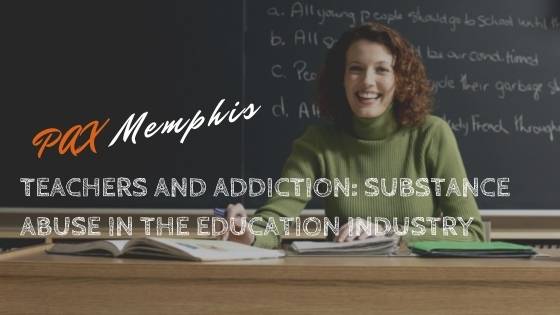Teachers and workers in the education industry are largely underpaid, underappreciated, and overworked. Despite the responsibility, skills, and support that educators bring to the table, they continually face threats of budget cuts, unruly parents, violence within their schools, and changing education policies.
Unfortunately, all of these factors work together to create a stressful and frustrating environment for teachers. Like any other profession, the stress of working in the education industry often leads to substance abuse and other unhealthy coping mechanisms.
Let’s take a look at the main factors that contribute to addiction in the education industry and the relationship between teachers and substance abuse.
High Levels of Stress
Teachers and educators alike deal with high levels of stress and anxiety. After all, they are tasked with shaping the next generation of students to be educated, well-rounded members of society.
According to studies, the main reason that teachers leave the education industry is due to the tension and the toll that teaching takes on one’s mental health.[1]
A 2014 poll on college and school staff revealed the shocking levels of adverse mental health effects that educators face as a result of their profession. More than half of the poll respondents reported a negative impact on their mental wellbeing, 80% noted feeling stressed at work, 70% expressed that their job leaves them exhausted, and 66% reported trouble sleeping as a result of their job.[2]
Just by looking at these statistics, it’s easy to see how difficult and mentally-taxing the job of an educator is.
Unfortunately, when teachers are suffering from mental health issues, it’s likely for them to hide their symptoms and feelings from co-workers, friends, and even family members. Their dedication to their career often causes them to ignore their mental health for the sake of their students.
Even though teachers are being overworked, they continue to show up and help their students, putting serious strains on their mental health. As a result, it is common for teachers and educators to look to substances to ease their stress.
A Cycle of Strained Teachers and Students
When the teacher is stressed, so are the students. Conversely, if students are stressed, the educator will begin to work harder, causing stress for the educator as well. According to TIME magazine, stress is a “contagion in the classroom”.[3]
When a teacher is stressed, they are often less effective at their job and disconnected with the students. This causes a cycle of the teacher being stressed, causing the students to stress, and then the students stressing the educator out even more. This leads to what is called “burnout”, meaning the teacher is so overworked and stressed that they are not functioning normally.
Unfortunately, teachers do not always have the resources they need to take care of their mental health. When a teacher becomes burned-out, they have no choice but to keep working and performing for their students. Oftentimes, they look to substances like cocaine to help them perform at higher levels, leading to addiction in the education industry.
High Standards
Teachers are held to incredibly high standards. It is common for educators to have to be cautious of their every move while outside of school.
For example, going out to a bar with friends for a drink could lead to a student or parent seeing them engaging in activities that individuals find inappropriate for teachers – even though they are not clocked in. Additionally, their social media activity cannot contain political content, activism, or anything that could be viewed as controversial or inappropriate for students. Because of this, teachers are always on the job.
Being held to such a high standard causes teachers to hide their real problems, such as stress or other mental health issues. If they cannot be themselves, they cannot be open about the struggles they face.
This causes their stress to build up over time and remain untreated or unacknowledged. As a result, educators and teachers begin to look for coping mechanisms. Oftentimes, this leads teachers to begin abusing substances.
Sleeping Problems
Teaching is not an easy profession. Typically, teachers have anywhere from 25-35 students in one classroom. This means when they assign homework, essays, or tests, they have to carefully grade at least 25 different assignments.
Additionally, teachers follow a curriculum that is decided by the board. Because of this, teachers cannot spend too much time on one lesson or one assignment. In other words, once an assignment is given, the papers and tests must be graded quickly so the class can move onto the next lesson. As a result, teachers often take work home, continuing their job well past 8 hours.
When teachers are working all day and night, they tend to lose sleep. As this becomes a pattern, it often becomes difficult for them to sleep at all. Unfortunately, the terms of their career do not allow for lost sleep. Teachers have to wake up in the morning and get ready to take care of their students. This leads to teachers misusing sleeping medication in order to get some rest, often causing addiction.
Addiction Treatment for Teachers and Educators
Addiction is a devastating and serious problem in the education industry. While it is common for teachers and educators to let their mental health and addiction issues take a backseat to their job, it is possible for teachers to get help.
If you or a loved one are dealing with the effects of burnout, stress, and addiction as a result of your educator career, PAX Memphis Recovery Center can help. The best way to recover from mental health issues and addiction is to attend an addiction treatment center. To find an addiction treatment program near you, contact us today.
References:
Medically Reviewed: September 25, 2019

All of the information on this page has been reviewed and verified by a certified addiction professional.










